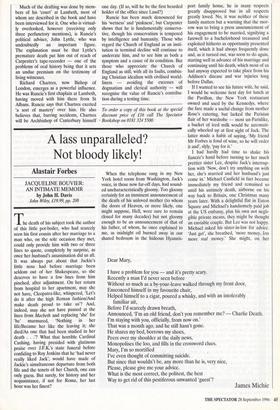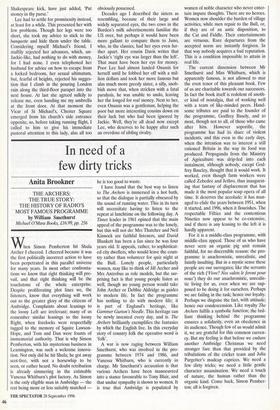A lass unparalleled?
Not bloody likely!
Alastair Forbes
JACQUELINE BOUVIER: AN INTIMATE MEMOIR by John H. Davis John Wiley, £19.99, pp. 208 The death of his subject took the author of this little pot-boiler, who had scarcely seen his first cousin after her marriage to a man who, on the sole occasion they met, could only provide him with two or three lines to quote, completely by surprise, as once her husband's assassination did us all. It was always put about that Jackie's little nose had before marriage been seldom out of her Shakespeare, so she deserves to have a few lines from him pinched, after adjustment. On her return from hospital to her apartment, may she not have, Cleopatra-like, whispered, 'Let's do it after the high Roman fashion/And make death proud to take us'? And, indeed, may she not have paused at the lines from Macbeth and replacing 'she' for 'he' murmured, 'Nothing in her life/Became her like the leaving it; she died/As one that had been studied in her death . . .'? What that horrible Cardinal Cushing, having presided with glutinous praise over J.F.K.'s state funeral before confiding to Roy Jenkins that he 'had never really liked Jack', would have made of Jackie's simultaneous departure from both life and the tenets of her Church, one can only guess. But surely, for history and her acquaintance, if not for Rome, her last hour was her finest? When the telephone rang in my New York hotel room from Washington, Jack's voice, in those now far-off days, had sound- ed uncharacteristically gloomy. Too gloomy certainly for an imminent announcement of the death of his unloved mother (to whom the doors of Heaven, or more likely, one might suppose, Hell, were sure to remain closed for many decades) but not gloomy enough to be an announcement of that of his father, of whom, he once explained to me, as midnight oil burned away in our shared bedroom in the hideous Hyannis-
port family home, he in many respects greatly disapproved but in all respects greatly loved. No, it was neither of these family matters but a warning that the mor- row was to bring a press announcement of his engagement to be married, signifying a farewell to a bachelorhood treasured and exploited hitherto as opportunity presented itself, which it had always frequently done and, as it turned out, was soon to do again, starting well in advance of his marriage and continuing until his death, which most of us had anyway expected to take place from his Addison's disease and war injuries long before Dallas.
If I wanted to see his future wife, he said, I would be welcome next day for lunch at the Pavillon, the New York restaurant owned and used by the Kennedys, where the fare made a useful change from mother Rose's catering, but lacked the Parisian flair of her wardrobe — most un-Parislike, a bucket of iced milk would be automati- cally wheeled up at first sight of Jack. The latter made a habit of saying, 'My friend Mr Forbes is fond of wine, so he will order it and', slyly, 'pay for it.'
I had hardly had time to shake his fiancde's hand before turning to her much prettier sister Lee, despite Jack's interrup- tion with 'Now, don't try anything on with her, she's married and her husband's just come in.' Michael Canfield in fact became immediately my friend and remained so until his untimely death, airborne on his way back to Britain, one Christmas many years later. With a delightful flat in Eaton Square and Michael's handsomely paid job at the US embassy, plus his own not negli- gible private means, they might be thought an enviable couple. But Lee was not happy. Michael asked his sister-in-law for advice. 'Just get', she breathed, 'more money, lots more real money.' She might, on .her Shakespeare kick, have just added, 'Put money in thy purse.'
Lee had to settle for promiscuity instead, at least for a while. This presented her with few problems. Though her legs were too short, she took my advice to stick to the banquette and hide them under the table. Considering myself Michael's friend, I stuffily rejected her advances, which, un- Jackie-like, had nothing to do with money, for I had none. I even telephoned her husband for advice on how to escape from a locked bedroom, her sexual ultimatum, but, fearful of heights, rejected his sugges- tion that I climb in the pouring London rain along the third-floor parapet into the next house. At last she agreed sulkily to release me, even handing me my umbrella at the front door. At that moment the Vicar of St Michael's, Chester Square emerged from his church's side entrance opposite, so, before taking running flight, I called to him to give his immediate pastoral attention to this lady, alas all too
obviously possessed.
Decades ago I described the sisters as resembling, because of their large and widely separated eyes, the two cows in the Borden's milk advertisements familiar the US over, but perhaps it would have been more gallant to compare them to Juno, who, in the classics, had her eyes even fur- ther apart. Her cousin Davis writes that Jackie's 'right eye was larger than the left'. That must have been her eye for money. Poor Lee had almost landed Onassis for herself until he fobbed her off with a mil- , lion dollars and took her more famous but alas much more greedy sister, a silly, snob- bish move that, when stricken with a fatal paralysis, he was unable to undo, leaving her the longed for real money. Next to her, even Onassis was a gentleman, helping the poor but more interesting cousins down on their luck but who had been ignored by Jackie. Well, they're all dead now except Lee, who deserves to be happy after such an overdose of sibling rivalry.



















































































 Previous page
Previous page